ARAGÜETE-TORIBIO, Zahira (2017). Confronting a history of war loss in a Spanish family archive
|
FECHA
|
TÍTULO | AUTORA | TIPO |
|---|---|---|---|
|
2017 |
Confronting a history of war loss in a Spanish family archive | Zahira Aragüete Toribio | Artículo |
|
FECHA
|
TÍTULO | AUTORA | TIPO |
|---|---|---|---|
|
2017 |
Confronting a history of war loss in a Spanish family archive | Zahira Aragüete Toribio | Artículo |
|
FECHA
|
TÍTULO | AUTORA | TIPO |
|---|---|---|---|
|
2015 |
A Curious Trade: The Recovery and Repatriation of U.S. Missing In Action from the Vietnam War | Sarah E. Wagner | Artículo |
| Fecha de publicación | Título | Autores | Tipo |
|---|---|---|---|
|
2017
|
Memory and Forgetting in the Post-Holocaust Era | Alejandro Baer y Natan Sznaider | Libro |
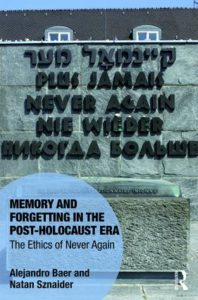
Olvidar después de Auschwitz es considerado una barbaridad. Baer y Sznaider cuestionan esta suposición, no sólo considerando el Holocausto sino también otros crímenes políticos. El deber de la Memoria entorno al Holocausto se han extendido por todo el mundo y ha interactuado con otras narrativas de victimización que exigen una igualdad de trato. ¿Hay crímenes que deben ser olvidados y otros que deben ser recordados?
En este libro los autores examinan los efectos que la cultura del Holocausto globalizada ha tenido en la forma en que los individuos y los grupos comprenden el significado moral y político de sus respectivas historias de extrema violencia política. ¿Estas memorias transnacionales facilitan u obstaculizan la tarea de alcanzar un acuerdo y superar las divisiones del pasado?
Tomando a Argentina, España y otros lugares de la Europa post-comunista como casos de estudio, este libro ilustra las transformaciones de una ética a nivel nacional a otra transnacional. Los autores analizan los medios de comunicación, el discurso académico, las ONG relacionados con los derechos humanos y la memoria, los museos y los lugares de memoria. Y examinan cómo la nueva generación de activistas de la memoria revisa el pasado para construir un nuevo futuro. Baer y Sznaider abordan estos intentos de maniobrar entre el deber de recordar y los beneficios de olvidar, lo que denominan como la “ética del Nunca más”.
TABLA DE CONTENIDOS:
List of figures
Acknowledgments
1 The Ethics of Never Again: global constellations
2 Nunca Más : Argentine Nazis and Judíos del Sur
3 Francoism reframed: the disappeared of the Spanish Holocaust
4 Eastern Europe: exhuming competing pasts
5 Beyond Antigone and Amalek : toward a memory of hope
Bibliography
Index
| Fecha de publicación | Título | Editoras | Tipo |
|---|---|---|---|
|
2017
|
Legacies of Violence in Contemporary Spain. Exhuming the Past, Understanding the Present |
Lisa Hilbink y Ofelia Ferrán | Libro |
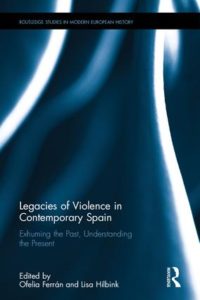
Este libro ofrece un estudio exhaustivo e interdisciplinario de los múltiples legados de la violencia franquista en la España Contemporánea, con especial atención a las exhumaciones de las fosas comunes de la época de la Guerra Civil y la postguerra. Las diversas contribuciones del libro se encuadran en una reflexión más amplia sobre la naturaleza, la función y los legados de la violencia ejercida por el Estado en sus múltiples formas. Ofreciendo sus perspectivas desde áreas tan variadas como la Historia, la Ciencia Política, los Estudios Culturales, la Literatura, la Antropología Forense y Cultural, los Derechos Humanos, la Sociología o el Arte.
Este libro está destinado no sólo para las personas interesadas en la España contemporánea, sino para todas aquellas que deseen acercarse a la Justicia Transicional y post-transicional ya sea desde otros contextos nacionales y/o regionales.
PODCAST:
Francisco Ferrándiz junto a las editoras del libro, Lisa Hilbink y Ofelia Ferrán, conversan sobre su contenido en el siguiente podcast de la University of Minnesota – Department of Spanish & Portuguese Studies
TABLA DE CONTENIDOS:
Prologue:Opening Graves to Restore Memory [José Antonio Martín Pallín]
Acknowledgments
Introduction: Legacies of Violence in Contemporary Spain [Ofelia Ferrán and Lisa Hilbink]
Part I: Mass Graves: “Unearthing” the Memories of Violence
1. Afterlives: A Social Autopsy of Mass Grave Exhumations in Spain [Francisco Ferrándiz]
2. The Spanish Civil War Forensic Labyrinth [Luis Ríos and Francisco Etxeberria]
3. Executed Women, Assassinated Women: Gender Repression in the Spanish Civil War and the Violence of the Rebels [Queralt Solé]
4. Beyond the Mass Grave: Producing and Remembering Landscapes of Violence in Francois Spain [Alfredo González-Ruibal]
Part II: Political, Legislative and Judicial Responses to Past Violence
5. Rude Awakening: Franco’s Mass Graves and the Decomposition of the Spanish Transition Dream [Ignacio Fernández de Mata]
6. Unsettling Bones, Unsettling Accounts: Spanish Perpetrators’ Confessions to Violence [Paloma Aguilar and Leigh A. Payne
7. Knocking on the Spanish Parliamen]t’s Door: The 2007 Law of Historical Memory and Its Aftermath [Rafael Escudero]
8. When You Wish Upon a Star: Baltasar Garzón and the Frustration of Legal Accountability for Franco-Era Crimes [Lisa Hilbink]
Part III: Cultural Representations of Violence
9. Poets of the Dead Society: The Cultural History of Francoist Mass Graves in the Pre-Democratic Poetic Archive [Germán Labrador Méndez]
10. Pasts in Conflict: Stylized Realism and its Discontents in Historical Memory Film [Carmen Moreno-Nuño]
11. Regarding Past Violence [Ofelia Ferrán]
Part IV: Interview with Baltasar Garzón
Truth, Reparation and Justice: Interview with Baltasar Garzón, Then Magistrate of the National High Court of Spain, Conducted 26 April, 2011, Minneapolis, MN [Ofelia Ferrán and Lisa Hilbink]
Epilogue: Memory Walks, Justice Awakes [Emilio Silva]
| Fecha de publicación | Título | Editores | Tipo |
|---|---|---|---|
|
2015
|
Human remains and identification Mass violence, genocide, and the ‘forensic turn’ |
Élisabeth Anstett y Jean-Marc Dreyfus | Libro |
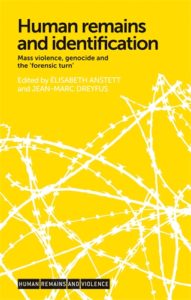
TABLA DE CONTENIDOS:
Introduction – Elisabeth Anstett and Jean-Marc Dreyfus
Part I: Agents
1. Bitter legacies: A war of extermination, grave looting, and culture wars in the American West – Tony Platt
2. Final chapter: Portraying the exhumation and reburial of Polish Jewish Holocaust victims in the pages of yizkor books – Gabriel Finder
3. Bykivnia: How grave robbers, activists, and foreigners ended official silence about Stalin’s mass graves near Kiev – Karel Berkhoff
4. The Concealment of Bodies during the Military Dictatorship in Uruguay (1973-84) – Jose Lopez Mazz
Part II: Methods
5. State secrets and concealed bodies: exhumations of Soviet-era victims in contemporary Russia – Viacheslav Bituitcki
6. A mere technical exercise? Challenges and technological solutions to the identification of individuals in mass grave scenarios in the modern context – Tim Thompson and Gillian Fowler
7. Disassembling the pieces, reassembling the social: the forensic and political lives of mass graves in Bosnia and Herzegovina – Sari Wastell and Admir Jugo
Part III: Stakes
8. ‘The political lives of dead bodies’ and ‘the disciplines of the dead’: a view from South Africa – Nicky Rousseau
9. Bury or display? The politics of exhumation in post genocide Rwanda – Remi Korman
10. Remembering the Japanese occupation massacres: mass graves in post-war Malaysia – Frances Tay
Index
| Fecha de publicación | Título | Editoras | Tipo |
|---|---|---|---|
|
2015
|
Disturbing Bodies Perspectives on Forensic Anthropology |
Zoë Crossland y Rosemary A. Joyce |
Libro |
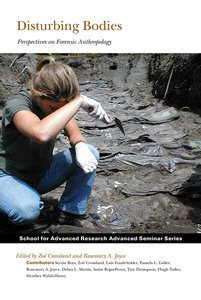
TABLA DE CONTENIDOS:
1-. Anthropological Perspectives on Disturbing Bodies: An Introduction
Zoë Crossland and Rosemary A. Joyce
2-. Forensic Anthropology and the Investigation of Political Violence: Notes from the Field
Luis Fondebrider
3-. Unearthing Ongoing Pasts: Forensic Anthropology, State Making, and Justice Making in Postwar Peru
Isaias Rojas-Perez
4-. Deconstructing the Ideal of Standardization in Forensic Anthropology Tim Thompson
Identification Versus Prosecution: Is It That Simple, and Where Should the Archaeologist Stand? Hugh Tuller
5-. Writing Forensic Anthropology: Transgressive Representations
Zoë Crossland
6-. Creating the Biological Profile: The Question of Race and Ancestry
Heather Walsh-Haney and Serrin Boys
7-. Hybrid Lives, Violent Deaths: “Seminoles” in the Samuel G. Morton Cranial Collection
Pamela L. Geller
8-. Excavating for Truths: Forensic Anthropology and Bioarchaeology as Ways of Making Meaning from Skeletal Evidence
Debra L. Martin
9-. Grave Responsibilities: Encountering Human Remains
Rosemary A. Joyce
Editado por SAR PRES
| Fecha de publicación | Título | Autora | Tipo |
|---|---|---|---|
|
2016
|
Reimagining Spain: Transnational Entanglements and Remembrance of the Spanish Civil War since 1989 | Marije Hristova | Libro |
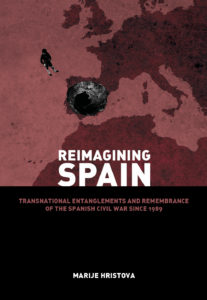
Desde 1989, España ha pasado por un proceso de re-emergencia de las memorias de la Guerra Civil española (1936-1939) y el franquismo (1939-1975). Estas “nuevas” narrativas mnemónicas desafían la lectura oficial de la guerra civil como una “locura colectiva”, establecida durante la transición a la democracia. Como parte de este proceso, durante las tres últimas décadas se han producido numerosas novelas, documentales y trabajos periodísticos que narran las historias no contadas de la represión durante la guerra civil y la posguerra.
Este libro ofrece un análisis de la influencia de los marcos transnacionales en la reconfiguración de las narrativas de memoria de la Guerra Civil española. La selección de textos culturales españoles producidos después del 1989 – narrativa, documental, fotografía y periodismo – analizada a lo largo del libro, está enmarcada por tres “espacios” de memoria transnacional emblemáticos. Estos son: las guerras en la antigua Yugoslavia; la desaparición forzada en el Cono Sur; y la memoria del Holocausto. Cada uno de estos espacios destaca un lugar de agencia diferente en la producción de la memoria, es decir, la guerra civil contemporánea, las exhumaciones de fosas comunes, y el testimonio. Además, el estudio plantea el afecto y la emoción como mecanismos importantes en la producción de memorias transnacionales.
Esta investigación sostiene que los contextos transnacionales de memoria sirven para re-imaginar España, proponiendo formas alternativas y más “inclusivas” de memoria e identidad nacionales y a menudo en oposición al “patriotismo constitucional” actual. Se arguye que la memoria transnacional se localiza en los márgenes del estado-nación, un espacio de entrelazamiento entre lo nacional y lo transnacional y “habitado” por aquellos que fueron excluidos de la identidad nacional española a través de la construcción del estado-nación español.
Editado por Universitaire Pers Maastricht
|
FECHA
|
TÍTULO | AUTORES/AS | TIPO |
|---|---|---|---|
|
2016 |
Exhumación, identificación y causa de muerte en 1936 de los restos humanos recuperados en la sima de El Raso de Urbasa (Navarra) | Lourdes HERRASTI Luis RÍOS Lorena PÉREZ DE LA IGLESIA, Miriam BAETA Carolina NUÑEZ Marian MARTÍNEZ DE PANCORBO Pedro CASTAÑOS Jone CASTAÑOS Francisco ETXEBERRIA |
Artículo |
|
FECHA
|
TÍTULO | AUTOR | TIPO |
|---|---|---|---|
|
2016 |
From tear to pixel: political correctness and digital emotions in the exhumation of civil war mass graves in Spain today | Francisco FERRÁNDIZ | Capítulo |
|
FECHA
|
TÍTULO | AUTORES | TIPO |
|---|---|---|---|
|
2016 |
Memory, media and spectacle: Interviú’s portrayal of Civil War exhumations in the early years of Spanish democracy | Paloma AGUILAR
Francisco FERRÁNDIZ |
Artículo |
El pasado bajo tierra: exhumaciones y políticas de la memoria en la España contemporánea en perspectiva transnacional y comparada
Proyecto:
PIE (CSIC) 200710I006
CSO2009-09681
CSO2012-32709
CSO2015-66104-R
COST IS1203 (ISTME)
H2020 REFLECTIVE-5-2015, ref. 693523 (UNREST)
Centro de Ciencias Humanas y Sociales - Consejo Superior de Investigaciones Científicas.
Despachos 1F25 y 1F18
C/Albasanz 26-28.
Madrid 28037 (España)
politicasdelamemoria@gmail.com
